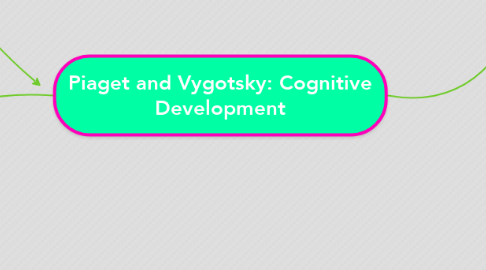Piaget and Vygotsky: Cognitive Development
by Miss Carla Archundia

1. The most evident differences between the two theories, is learning independently versus learning with assistance or input from outside influences. Piaget believes cognitive growth occurs when a child explores his or her environment and surroundings on their own. Vygotsky believes that children need to be assisted to some degree for tasks within or above their Zone of Proximal Development.
2. Cognitive development is how the brain changes in order to acquire thinking skills, understanding language and reasoning, ultimately helping to shape individual personalities. Cognitive development, especially with children in elementary school, is obtained through hands on tasks that require constructive thinking. Being active in the learning process allows students to own their understanding, which will lead to an increase in their cognitive ability.
3. "In Piaget's view, children are largely in control of their own development; for example, they initiate interactions with objects in their environment and develop self constructed understandings of what they observe"
4. Piaget's Theory
5. Comparison: Both Piaget and Vygotsky believed that in order for cognitive growth, children must be challenged at an appropriate level for their age and prior knowledge. Both of their theories also distinguish multiple stages based on age. Both theorists believe that conducting independent tasks are part of the path to a child's cognitive development.
6. Cognitive development in four specific stages based on age range. Sensorimotor - This stage is roughly from birth-2 years of age and is mostly based on bahaviors and perceptions. It is based on what is happening in the moment; Preoperational - This stage ranges from about 2-6 years of age. Children can now talk and think beyond the immediate surroundings; Concrete Operations - This stage is roughly from 6-11 years of age. It now incorporates reason, but for reasoning to occur the situations must be real life situations about which the child has some prior knowledge; Formal Operations - This stage begins from about 11 or 12 years of age and beyond. Children are now able to use logical reasoning, even from abstract ideas. Essential to his theory, each stage is built upon the previous stage, not independent from one another. (Ormrod, 2014) In 5th grade, students should be in the formal operations stage.
7. Vygotsky's Teory
8. Biological factors play an important role in a child's development. Adults, social factors, schooling and culture are all keys to a child's cognitive development. Unlike Piaget, Vygotsky placed the emphasis of a child's development as an external force rather than internal.
9. Vygostsky's Zone of Proximal Development (ZPD) is a major part of his theory. The ZPD is the "range of tasks that a learner can perform with the help and guidance of others but cannot yet perform independently" As tasks increase in difficulty, the child will require more assistance or support. Vygotsky believed that in order to promote cognitive development, children must be within their ZPD. Vygotsky specifies that the "actual developmental level is the upper limit of tasks that he or she can perform independently, without help from anyone else"


